 |
 |
 |
Meat and cookies don’t always stand for meat and cookies.
It’s always interesting to see the response to episodes of a Gundam series in the usual places where people vote on such things (you’re familiar with these popular sites, I’m sure) especially a Gundam show like this one with its somewhat unusual pedigree. Episodes like this one and the one before almost invariably (I would say just “invariably” based on every instance I remember) score lower than ones like Episode 7 – action-driven episodes that are heavy on franchise canon.
Stuff like that I wonder where Tekketsu no Orphans is going to fit into the larger Gundam pantheon when it’s all said and done. In terms of disc sales it looks poised to be a middling Gundam performer if Stalker is to be believed – better than the obviously atypical “Build Fighters” series but nowhere near the nosebleed numbers of some more traditional editions. Is “Orphans” kind of a tweener, I wonder? It hasn’t had all that much action so far, really. And given that’s it’s written by what’s-her-name, it’s been pretty light on the outrageous and melodramatic too. It doesn’t seem to be hewing tightly to the tastes of fans of either the franchise or the writer – will it end up kind of working for almost everybody, or leaving almost everybody unsatisfied?
One thing I know is that there’s a definite sense of waiting for the other shoe to drop, either in the Gundam sense or the Ok*da sense. There was a burst of violence early on, but the current tone of the series is decidedly low-key and even philosophical. The dominant themes are politics and social convention – rather than a war itself, the aftermath of a long-ago one and the machinations involved in trying to prevent another. And the notion of what a family is – with an embrace of decidedly not-traditional definitions. Biology and the nuclear model take a decided back seat to emotional bonds in the world of Iron-Blooded Orphans.
The newest spin on this is Teiwaz, represented in the very large person of McMurdo Barriston. It certainly doesn’t hurt to have him voiced by one of the very best in Ishizuka Unshou, who immediately brings that peculiar type of heft that only he (well – and Ootsuka Akio) can. Barriston is the head of another type of family, right down to the cannoli – it’s no coincidence that Naze calls him “the old man”. He’s very much the godfather here, and what he’s effectively doing is inviting Orga and Tekkadan into his family. But that comes with a very real price.
No question, a very significant theme of this episode is the notion of what it means to become an adult. We get the very unusual spectacle of anime actually showing minors getting drunk (though it’s generally fine with showing them getting killed), but that’s just playing house – the real lesson here is in the agreement with Barriston. Some of the kids are more aware of it than others (Biscuit I think most of all, and Mikazuki more than he lets on), but they’re giving up a tremendous amount in exchange for this connection – much of their freedom, in fact, and not just in what they choose to do but in what they choose to stand for. And that certainly applies to Kudelia, too.
This is what sticks with me – the idea that adulthood means accepting that in order to get something you have to give something up. One must compromise in terms of goals, resources and ideals – choose what your priority is and act based on that. Orga getting drunk and playing the fool, I think, is his way of trying not to think about everything he’s giving up in service of his top priority, his family. We see scenes of the younger boys excitement over the sweets Orga buys them with the spoils of Naze’s sale of Gjallarhorn’s stolen property, but this too is a rather childlike attempt at playing parent on Orga’s part – and even one of the little ones like Ride can see this as an opportunity to think about the even younger boys.
It’s hard not to walk away at this point without being struck by how unprepared all these kids are for what lies ahead of them. Atra has no idea about the complexities of relationships (in any sense). Kudelia’s understanding of the political dynamic she’s trying to reshape is naive and sketchy. All of them are being forced to do grown-up things in order to survive, but they’re not grown up (“guilty children”, indeed) – and they’re valuable tools in the hands of those who are, and want something from them. All they have, in the end, is each other – and it’s hard to imagine that’s going to be enough to guide them through the minefield of treachery and deceit that lies before them unscathed.
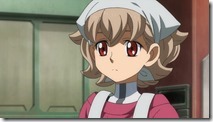 |
 |
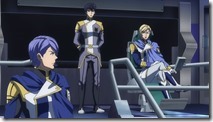 |
 |
 |
 |
 |
 |
 |
 |
 |
 |
 |
 |
 |
 |
 |
 |
 |
 |
 |
 |
 |
 |
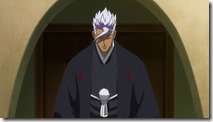 |
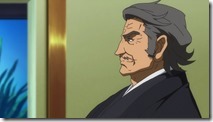 |
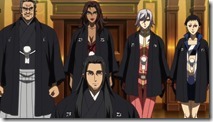 |


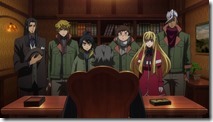
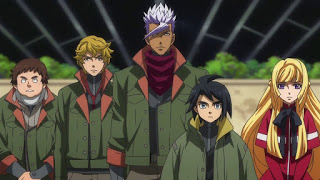
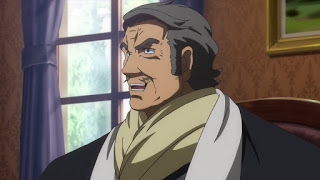
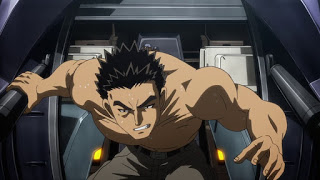
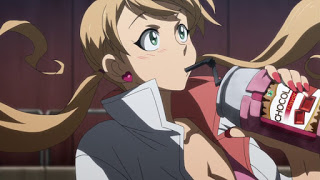
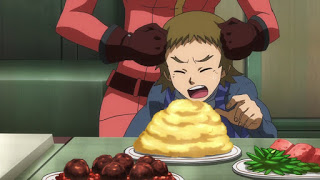



Roger
November 30, 2015 at 10:46 amIt doesn't seem to be hewing tightly to the tastes of fans of either the franchise or the writer – will it end up kind of working for almost everybody, or leaving almost everybody unsatisfied?
Perhaps, we could apply the whole growing up theme of the episode a little to the meta level. For Gundam fans, IBO marks that realization that a (mecha) war story isn't just about giant robots banging into each other anymore, but more about the people caught in between the conflicts. And for Okada fans (and, yes, even naysayers), it might be an indication that, perhaps, the woman has already outgrown her earlier penchants.
And yeah, I like that naivete Atra showed in her "meat and cookies" conversation with Amida, where the woman clearly means "things" that the girl has yet to experience (see that interesting distinction?).
Kamui
November 30, 2015 at 3:25 pmGundam as a whole has been in a debacle for at least two decades. Turn A which, at his time and even today, was almost as polarizing as G-Reconguista was. Or the commercial hits, but totally dry in terms of characters or any deep in storytelling that SEED/SEED Destiny were. To the one that could change it all but decided to play it safe at the end Gundam 00. And then the fiasco that Age was, a fiasco that could have revitalized the franchise but they let a incompetent writer at the reins and we all saw how that turned up.
Gundam needs new blood, and not just in terms of how the story is presented, but its fans too. GunOta are one of the strengths that keeps the franchise alive, but is also its greatest weakness. They fear change, and seem to be only interested on the same retellings of Mobile Suit Gundam or the One Year War, but with different characters. They also seem to like those plots that can be summarized as "super mega super Zeon project that could have won the One Year War, but never had the chance".
I'm not exactly thrilled about IBO, even is I'm actually liking it. But at least I've gave it the chance to surprise me, and so far it's doing it just fine.
Chrysostomus
December 1, 2015 at 7:27 pmUhhh what? Turn A is not polarizing at all nowadays. If anything it's hailed as the greatest Gundam series after 0079 itself.
Or at least third best after Z.
Deluxe
November 30, 2015 at 6:51 pmThis episode was a bit better than last week, the plot felt like it was getting somewhere instead of useless banter. I'm still wondering why the space yakuza are so friendly and welcoming with a bunch of a no-name boys who stole their assets and killed their superiors, but I guess Okada is more interested in discussing the character's sexuality than picturing a believable sci-fi universe.
I agree with the fact that everything we've seen so far seems to be the appetiser and that the real deal is awaiting. It's just uncommon for a show to make the audience wait this long before actually starting.
Roger
December 1, 2015 at 1:37 amI'm still wondering why the space yakuza are so friendly and welcoming with a bunch of a no-name boys who stole their assets and killed their superiors,
Maybe because they are alike, in the sense that both groups are essentially social outcasts. Sure, the space yakuza have their influence, but they are still seen as a "shady" bunch, as opposed to the "benevolent" Gjallarhorn. And most likely because Kudelia is with them, McMurdo said it himself, she can become a game changer in the political side of things, so being seen as her protector could be an advantage to Teiwaz.
but I guess Okada is more interested in discussing the character's sexuality than picturing a believable sci-fi universe.
This is a rather tricky assertion. You have to ask: what would make a "believable" sc-fi universe, well, believable? Is it the techie stuff or the characters that populate that universe? In a way, Okada tackling the sexuality of the characters in the context of the series' universe is her way of crafting a "believable" scifi world that is not just about the technobabble but also how people actually live in that 'verse.
admin
December 1, 2015 at 1:47 amI think the reason is mostly Kudelia, to be honest. She's the goose that laid the golden egg. And you have a lot better chance to keep her in cooperative mode a lot longer if you play nice with her friends.
sonicsenryaku
December 1, 2015 at 1:40 amThis is how nagai operates: his M.O is heavy character establishment while sprinkling in bits and pieces of actions to tantalize the viewer and have them wanting more. Then, as the audience become engaged with the characters and their goals, he begins to ramp the action up (emotional drama in his less action oriented shows) so that you're that more invested in it, keeping the series at high momentum from episode to episode until the arc is over. This was nagai's approach to railgun S and that series really benefitted from it. It's a style that i appreciate as it really fleshes out his works and make them really enjoyable viewing experiences. It's also a plus that nagai is pretty competent in directing action (and his crew of animation directors) as well as character drama. You dont see that combo in the anime landscape nowadays.
admin
December 1, 2015 at 1:48 amYeah, I certainly know how Nagai rolls. But is it anything that the Gundam audience is going to be receptive to?
sonicsenryaku
December 1, 2015 at 3:36 amso far ive seen a sort of middle ground in terms of reception from gundam fans. Those that werent gundam fans and are trying to get into gundam (because they arent fans of the mecha genre) are pretty thrilled by IBO and those that are gundam fans either like IBO or think it's a step down because it doesnt have "enough space battles" or screaming from the cockpits or heavy political squabling.
I recall in one some of your post, you mentioned how you were hoping (ironically) to see okada inject more of her style into gundam rather than just playing it safe, to which i found to be an interesting observation. however, i would now argue that those okad/nagai finger prints are starting to show themselves more. Okada usually writes narratives with themes such as adolescents learning what it means to grow up and struggling with the responsibilities that come with adulthood. Honey and clover-coming to terms with adulthood, anohana- dealing with death and growing up with it, ultimately paving one's way to self-improvement. NagiAsu- how time changes us and…….learning how to grow up. Toradora- learning how to accept ourselves for who we really are and……growing up……im starting to notice a pattern 😛
admin
December 1, 2015 at 3:55 amTrust me, the irony of me wanting that from Okada in an existing series isn't lost on me. Maybe it's easier because I'm not a die-hard Gundam fan and not as emotionally wedded to the franchise as some.
What I would argue is happening, in partial disagreement with your thesis, is that it's Nagai whose identity is starting to break into the franchise orthodoxy more than Okada. And if so, I don't think that would be a bad thing.
Roger
December 1, 2015 at 6:07 amWhichever way it is, be it Okada's or Nagai's (I haven't seen a lot of the latter's work, so I'm leaning towards the former) imprint, I could say that IBO is well in its way to being a very distinct entry in the franchise. The decision alone to focus more on character dynamics than the robot battles, while not probably fitting in with the more, shall we say, "exclusive" fans, is certainly something that more open fans like me are welcoming.
sonicsenryaku
December 1, 2015 at 9:22 amoh yea it's definitely more of nagai's identity i see here than okada's; notice how Nagai's name is more prevalent in those list of shows than okada (i ultimately find this woman an ok writer)
rebiawatkins
December 1, 2015 at 1:47 amWow, a very insightful and almost prophetic post from you (concerning the plot). I'm very curious to see how accurate your foreshadowing is regarding the treachery and emotional and mental breakdowns that are likely to occur in later episodes. On the surface, everything that has happened to Tekkadan recently has been good, and everything has been going their way. But as you wrote, really they are giving up a lot of their freedom in return and they are in a very vulnerable position. In Kudelia's case, she seems to be making her own decisions, but how much of that is just her having no other options?
All I hope is that Teiwaz and Barriston don't unfairly exploit the children or cause them (especially Orga) to turn into monsters that they'd never wished to become. …That would make for great melodrama though
Chrysostomus
December 1, 2015 at 8:13 pmSo did anyone else catch the implication that Norba and Eugene lost their virginities to prostitutes?
The series is a slow burner for sure, but I'm okay with that because I like how the characters bounce off each other. Unfortunately Kudelia is the weakest major character in my opinion, and she's the female lead!
sonicsenryaku
December 2, 2015 at 12:16 amyea i did when they stated that they had became "adults"…i sort of like "hintedy-hint hint" moment there
Roger
December 2, 2015 at 10:48 amThis particular aspect of the episode is interesting in that some viewers (like Deluxe above) are questioning why the heck is Gundam talking about sex and sexuality (and yes, Naze's harem) now. To me though, this is long overdue. Gundam has long skirted around the topic, which is odd considering that most protagonists and main characters are teenagers with all those raging hormones. Besides, IBO's setting actually opens itself to the topic in that these young boys and girls are in a scenario where they are not bound by traditional social norms.
Chrysostomus
December 3, 2015 at 1:12 amVery good observation… but I dunno why, really. I suppose Okada wants to bring someone new to the table and avoid the "Hey, kids, war is bad!" message that's been regurgitated ad nauseam for 30 years?
So far I have no problem with it, and I'm curious to see what else Okada will do with it, she seems to be introducing a very obvious gay subplot now.
Roger
December 3, 2015 at 3:16 amThe very obvious gay subplot actually makes sense with the Tekkadan boys in that it's only each other that they get to interact with each other during their puberty, which also makes Shino and Eugene being proud of finally experiencing sex all the more sensible. Amusingly, Naze's line in ep 8 of how "creepy" Tekkadan's all-boys setup seems to be a take that to viewers who find it to be such, yet celebrate his "manly" harem.
It's also interesting to note that Okada seems to be the first writer for the franchise in a long while to go well beyond the usual way the "Hey, kids, war is bad!" theme is presented. In her scenario, war is truly hell in that it isn't just about about people getting blown to bits, but also suffering its devastating effects such as poverty. This is also where her segue into sex and sexuality actually makes sense, because in regions of perpetual conflicts, traditional morality and social norms pretty much break down as people try to eke out a living.